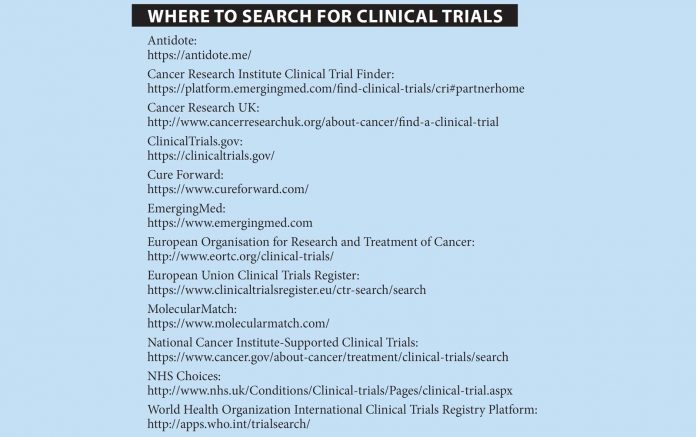Posted: February 2017
By Cynthia L. Kryder, MS
Clinical trials are essential to the development of new, potentially lifesaving therapies for patients with cancer. Well-designed clinical trials contribute to medical advances and evidence-based medicine. Nevertheless, the Cancer Research Institute estimates that only 3% to 6% of patients with cancer who are eligible for clinical trials actually participate.1 For patients with advanced lung cancer, access to emerging treatments through a clinical trial may be the best therapeutic option.
Streamline the Data
Increasing patients’ awareness of clinical trials, helping them to understand the benefits of clinical trial participation, and guiding them to suitable clinical trials are important aspects of cancer care. However, existing databases such as ClinicalTrials.gov and the European Union Clinical Trials Register, which are designed primarily for healthcare professionals and are often filled with medical jargon, can be hard for patients to navigate and understand.
In the United States, streamlining clinical trial information to make it more accessible to patients is one goal of the Cancer Moonshot effort, a $1 billion US initiative to facilitate cancer research. One element of the Cancer Moonshot is the National Cancer Institute (NCI) application programming interface (API), which allows outside organizations to access specific clinical trial data in the NCI database and integrate this information with their own unique applications. In addition, the NCI recently released its own streamlined interface where consumers, healthcare providers, and advocates can more easily find NCI-supported clinical trials.
In recent years, organizations have emerged that will match patients with suitable clinical trials based on a patient-provided profile. Antidote, a patient advocacy group, and Cure Forward, a digital health company, are two examples. Both organizations use the NCI API to integrate NCI data into their own databases. MolecularMatch offers a searchable online database that connects patients with personalized treatment options based on their particular molecular and genetic profiles. Moreover, through the online portal, MolecularMatch Lab, pathology laboratories and others can match patients’ test results to personalized cancer treatments, including clinical trials and experimental drugs, in real time.
Another organization making information about clinical trials in cancer immunotherapy more accessible is the nonprofit Cancer Research Institute (CRI). Through a partnership with EmergingMed, CRI developed the Cancer Immunotherapy Clinical Trial Finder, a searchable online database that features studies using immunology along with the full national database of cancer treatment trials from all sponsors.
Several searchable online databases are available where patients and healthcare professionals can search for clinical trials outside of the United States. These include Cancer Research UK, the European Organisation for Research and Treatment of Cancer, the European Union Clinical Trials Register, and NHS Choices. The World Health Organization (WHO) maintains the International Clinical Trials Registry Platform (ICTRP) search portal, through which users can search for trials registered in multiple countries, including Australia, Brazil, China, Cuba, Germany, Iran, Japan, the Netherlands, the Republic of Korea, and New Zealand.
Harness the Power of Social Media
As social media platforms have become tools to enable patients with cancer to gather and exchange information and provide support, the next logical step may be to use social media to communicate with patients about clinical trials. The results of a recently published pilot study suggest that Twitter could be a way to increase awareness of clinical trials and enhance recruitment.2 Physicians at the Abramson Cancer Center of the University of Pennsylvania analyzed a random sample of more than 1,500 tweets out of a total of 15,346 unique tweets that contained the phrase “lung cancer” during two weeks in January 2015. Although the majority of tweets analyzed (56%) were focused on prevention or psychological support, the next largest category of tweets (about 18%) was about clinical trials. Most of the clinical trial tweets were about human research into a specific drug or device; 79% were about immunotherapy and 86% included embedded links to news articles. Interestingly, only one tweet linked readers to a patient recruitment website.
The hashtag has made Twitter a popular platform for patients with cancer. The Healthcare Hashtag Project created standardized hashtags for diseases, conferences, Twitter chats, and ontologies, and has enabled disease-specific communities to flourish on Twitter. The most widely recognized hashtag for lung cancer, #LCSM (Lung Cancer Social Media), evolved from a simple hashtag into an online community with a website and biweekly Twitter chats (#LSCMChat). In fact, the topic of a recent #LSCMChat was a live question-and-answer session with the NCI on immunotherapy and clinical trials.3
Social media interactions such as these can increase awareness and boost recruitment in clinical trials, enabling more patients with advanced lung cancer to gain access to promising new treatments that are only available to those enrolled in clinical trials.
Where to Search for Clinical Trials
- Antidote
- Cancer Research Institute Clinical Trial Finder
- Cancer Research UK
- ClinicalTrials.gov
- Cure Forward
- EmergingMed
- European Organisation for Research and Treatment of Cancer
- European Union Clinical Trials Register
- MolecularMatch
- National Cancer Institute-Supported Clinical Trials
- NHS Choices
- World Health Organization International Clinical Trials Registry Platform
References
1. Cancer Research Institute [website]. About clinical trials. 2017. http://www.cancerresearch. org/cancer-immunotherapy/about-clinicaltrials# sthash.4MOWPCWY.dpuf. Accessed January 3, 2017.
2. Sedrak MS, Cohen RB, Merchant RM. Cancer communication in the social media age. JAMA Oncol. 2016;2(6):822-823. doi:10.1001/ jamaoncol.2015.5475.
3. #LCSM Chat topic 11/17—FB Live Q&A with NCI on immunotherapy and clinical trials. https://lcsmchat.com/2016/11/15/ lcsm-chat-topic-1117-fb-live-qa-with-nci-onimmunotherapy- and-clinical-trials/. Accessed January 3, 2017.











